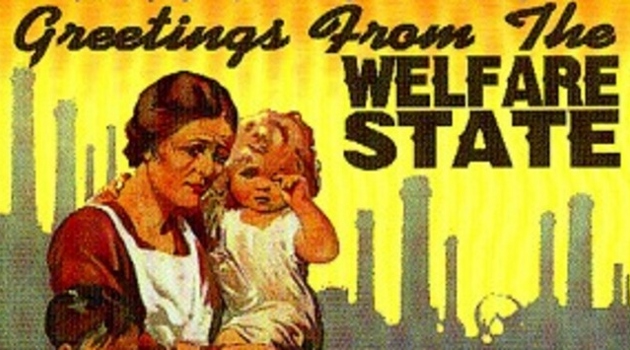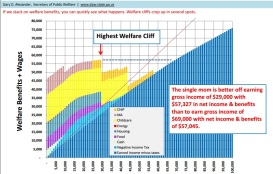Ten days ago, I shared some data and evidence illustrating how redistribution programs result in high implicit tax rates and thus discourage low-income people from climbing the economic ladder.
Simply stated, why work harder or work more when an additional dollar of income only leads to a net benefit of 10 cents or 20 cents? Or why work harder or work more when you can actually wind up being worse off?
Or why work at all if the governments provides enough goodies?
But don’t ask such questions if you’re in the same room as Helaine Olen of the Washington Post. She is very upset that some people think welfare payments discourage work.
It’s a dangerous myth, this idea that government help causes some people to just loaf off. It’s also untrue. Reminder: Before the pandemic, most working-age people receiving benefits like food stamps worked. They just didn’t earn enough money. …the temporary child tax credit signed into law this year by President Biden demonstrates the opposite. It is an extraordinary success. Almost 90 percent of families with children under age 18 are eligible to receive a monthly check from the federal government through the end of the year. …Many other developed nations offer almost all residents a child allowance of some sort.
If you read the entire column, you’ll notice that she provides very little evidence, particularly considering her very bold assertion that a negative link between redistribution and labor supply is “a dangerous myth.”
Yet we know from the experience of welfare reform in the 1990s that work requirements did boost labor supply.
And don’t forget about the very recent evidence that turbo-charged unemployment benefits encouraged more joblessness.
We also have evidence from overseas showing that there’s a negative relationship between handouts and idleness.
Including research from the Netherlands and the Nordic nations such as Denmark. And the same is true in Canada. And the United Kingdom.
Ms. Olen seems primarily motivated by her support for permanent per-child handouts, as President Biden has proposed.
And she wants us to believe that everyone will continue to work, even if they can get $3000-plus for each kid, along with all the other goodies that are provided by Uncle Sam (often topped up by state governments).
For what it’s worth, I think she admits her real agenda toward the end of her column.
…an argument can be made that the children of the irresponsible deserve more support from us, not less. Children can’t push their parents to get with the work-and-education program. As a result, you’re not “helping” children if you insist on financially punishing their parents for not making an “effort.” …human infrastructure matters too.
In other words, Ms. Olen seems to share Rep. Ocasio-Cortez’s view that money should be given to people “unwilling to work.”
Which is how some of our friends actually view the world. They think there is a right to other people’s money. Which is why they support big handouts, including so-called basic income.
The bottom line is that Biden’s per-child handouts and other expansions of the welfare state clearly would make work less attractive for some people.
Not all people, of course, because it takes time to erode societal capital.
But why would we want a society where a growing number of people think it’s okay to live off of others?
P.S. There is scholarly research that redistribution programs lure older people out of the workforce.
P.P.S. There is also scholarly research showing redistribution programs discourage households from building wealth.



